翻译理论概论(英文)
翻译理论概述_英汉互译课件

Definitions given by Western scholars:
● 翻译是翻成本族语言或另一种语言(to turn into one’s own language or another language)(美国韦氏新大学词典) ●好的翻译应该是把原作的长处完全地遗注到另一种语言,以使译入语所属国家 的本地人能明白地领悟、强烈地感受,如同使用原作语言的人所领悟、所感受一 样。(泰特勒,1790) ●翻译就是用一种语言把另一种语言在内容与形式不可分割的统一中所业已表达 出来的东西准确而完全地表达出来。(费道罗夫,1953) ● According to Catford, translation is “ the replacement of textual material in one language (SL) by equivalent textual material in another language (TL)”. (翻译的定义也许可以这样说:把一种语言(SL)中的篇章材料用另一种语言 (TL)中的篇章材料来加以代替。)(卡特福德,1965) ● ●翻译是把一种语言的言语产物在保持内容方面(也就是意义)不变的情况下改 变为另外一种语言的言语产物的过程。(巴尔胡达罗夫,1985中文版) ● According to Newmark, translation is “ a craft consisting in the attempt to replace a written message and/or statement in one language by the same message and/or statement in another language”(2001a:7).
英汉翻译第2章(翻 译 概 论)

Regardless of appearance, Jack is innocent. 原译: 不管迈克的相貌如何, 他都是无辜的。 改译: 不管迈克的外表如何,
二、漏译
群众是复杂的, 工作又很多。 原译:the masses of people are complex. Especially in the present masses ,there are extremely complex elements. 改译: And we have a lot of work to do.
第三节 翻译的标准 (P8)
翻译的最高标准和最低标准
最高标准是翻译的理想境界,是翻译工 作的努力方向。最低标准是指译文起码 应该达到的水平, 低于这个水平就是不 合格的翻译, 失败的翻译。 不合格的翻译 译文中若出现下列情况,译文读者得不 到与原文读者大致相同的感受,即属于 不合格的翻译。
三、 翻译是两个语言社会(language-community) 之间的交际过程和交际工具,它的目的是促 进本语言社会的政治、经济和(或)文化进 步,它的任务是要把原作中包含的现实世界 的逻辑影响映象或艺术映象完好无损地从一 种语言移注到另一种语言中去。
第二节 翻译的分类
一、根据翻译活动形式 (一)口译(oral interpretation) 1. 连续传译(consecutive translation) 同声传译(simultaneous translation) (二)笔译 ( translation) (三)机器翻译 (machine translation) (四)网络翻译(online translation)
English-Chinese Translation (英汉翻译 )
lecture_1__翻译概论

3) In terms of the media by which translation is done: oral, written and machine 从翻译的手段来分类,翻译可分为口译(oral interlingual translation)、笔译(written interlingual translation) 和机器翻译 (machine translation); 4) In terms of the subject matter: 从翻译的题材来分类,翻译可分为专业文献翻译(translation of English for science and technology)、文学翻译(literary translation)和一般性翻译(practical writing translation); 5)In terms of the manner: 从翻译的处理方式来分类,翻译可分为全译(full translation)、 摘译(partial translation)和编译(translation plus editing)。
E-C and C-E Translation Basics
英汉-汉英翻译基础
Lecture 1
Introduction to Translation
I. What is Translation?
1. A story of translation in Bible Long long ago, all the people speak the same language . When they transferred to the east, they found a plain and then lived there. They decided to build a tall tower, so that it can stretch to the heaven and they can live in the heaven. When Jesus saw this, he was afraid that if all the people speak the same language, they can do everything they want. So Jusus went down from the heaven and confused their languages so they couldn’t communicate with each other and they didn’t finish the Bable Tower. Since then, people lived in different places and spoke different languages. Hence comes the translation.
目的论在翻译中的应用——以英译《翻译概论》第九章为例

口 结 语
从上述 分析 中我们 可 以看 出 ,翻译 的归 化与异化并
。
【 文 章 编 号 l 1 0 0 9 . 6 1 6 7 ( 2 0 1 7 ) 0 4 — 0 0 5 4 . 0 2
没 择 有 翻 绝 译 对 策 的 略 界 上 也 限 并 , 更 非 没 无 有 章 所 可 谓 循 的 优 劣 之 分, 但 译 者 在 选 Ⅱ 引 言 因此 ,我们 可以得 出结
,
,
。
参考文献
f 1 】 V e n u t i ,L a wr e n c e .T h e T r a n s l a t o r ’ s I n v i s i b i l i t y A Hi s t o r y o f
相 比之下 ,林的译文更为简明。 从 以上 例子我们 可以看 出 ,对于 中西文 化中相 同的 文化词 ,一般来说 ,归化法 能更 为简练直观 地传达原文 意思 而不必担心文化差异导致译 文读者理解 困难 。
,
笔者在 文中将结合翻译 实例加 以分 析 ,深化对 目的论这
种翻译理论 的理解 ,期望该研 究能对 以后 的翻 译实践 带 来一定的启迪 。 【 关键词 l翻译概论 ; 目的论 ;翻译 策略 【 中图分 类号】H0 5 9 【 文献标识码】
,
5 4
的玻璃 ,这一点在 上述 两个英译 《 浮生六记》 版本 中也 得 到 了体 现 。但 此 外 ,笔 者认 为 ,随 着 中 国文化走 出 去 ,世 界对 中国文 化 愈来 愈感 兴趣 。加 之 ,在笔 者看 来 ,《 浮生六记》 虽无 疑为佳作 ,但终究不如 《 孔子》等 国学典籍 著名 。因此 ,有心挑选 《 浮生六记 》译 文来欣 赏的西方 读者 想必会 对 中国文化 有所涉略 ,对 于 中国 些基本 的文化意象也 有所耳 闻。在考虑到 目标 读者接 受性 的前 提下 ,适 当的异化相 比于归化 ,更能完 整地保 留中 国文化 的独特 之处 ,对 于 传播 中国文 化也 大有 裨 益 。在全 球化 的今 天 ,异化在 翻译 有中 国特 色的一些著 作上 ,也不失为一种可取 的翻译策 略。
中医英语翻译理论
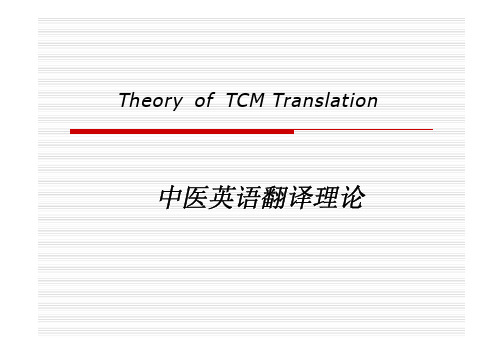
1 中医翻译概论
� 1.2 定义化
� 中医术语高度凝炼,难以用同样长短的英语表达清楚 � 翻译往往以解释、定义方式進行 � 辨证论治
� diagnosis and treatment based on the overall analysis of symptoms and signs
� 虚胀 � Flatulence due to yang-deficiency of the spleen and kidney
3 中医翻译实践
� 3.2 直译 � � � � � 阴阳失调 脾失健运 肝不藏血 胃失和降 肾阳不足
� yin-yang disharmony / imbalance between yin and yang spleen failing to move and transform / dysfunction of spleen; failure of spleen in transportation liver failing to store blood / inability of the liver to store blood impaired harmonious downbearing of the stomach / failure of gastric qi to descend insufficiency of kidney yang / insufficiency of renal yang
� � � � � � 心悸 便秘 便溏 遗尿 黄疸 纳呆 � � � � � � palpitation constipation loose / sloppy stool enuresis / incontinence* jaundice anorexia*, poor appetite / torpid intake
翻译概论术语整理
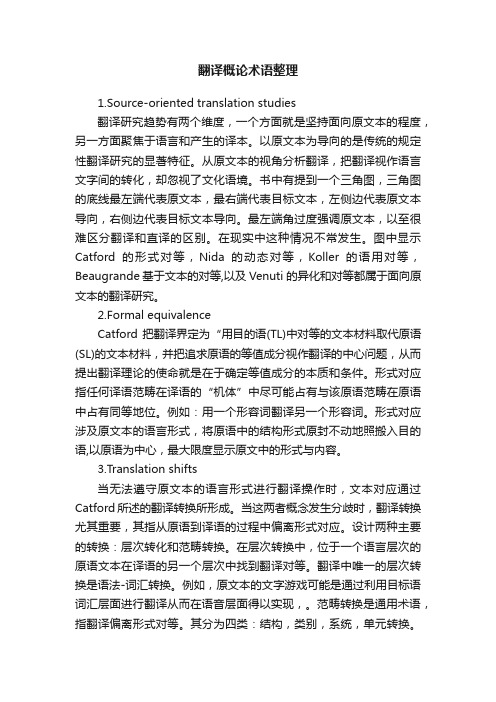
翻译概论术语整理1.Source-oriented translation studies翻译研究趋势有两个维度,一个方面就是坚持面向原文本的程度,另一方面聚焦于语言和产生的译本。
以原文本为导向的是传统的规定性翻译研究的显著特征。
从原文本的视角分析翻译,把翻译视作语言文字间的转化,却忽视了文化语境。
书中有提到一个三角图,三角图的底线最左端代表原文本,最右端代表目标文本,左侧边代表原文本导向,右侧边代表目标文本导向。
最左端角过度强调原文本,以至很难区分翻译和直译的区别。
在现实中这种情况不常发生。
图中显示Catford的形式对等,Nida的动态对等,Koller的语用对等,Beaugrande 基于文本的对等,以及Venuti的异化和对等都属于面向原文本的翻译研究。
2.Formal equivalenceCatford把翻译界定为“用目的语(TL)中对等的文本材料取代原语(SL)的文本材料,并把追求原语的等值成分视作翻译的中心问题,从而提出翻译理论的使命就是在于确定等值成分的本质和条件。
形式对应指任何译语范畴在译语的“机体”中尽可能占有与该原语范畴在原语中占有同等地位。
例如:用一个形容词翻译另一个形容词。
形式对应涉及原文本的语言形式,将原语中的结构形式原封不动地照搬入目的语,以原语为中心,最大限度显示原文中的形式与内容。
3.Translation shifts当无法遵守原文本的语言形式进行翻译操作时,文本对应通过Catford所述的翻译转换所形成。
当这两者概念发生分歧时,翻译转换尤其重要,其指从原语到译语的过程中偏离形式对应。
设计两种主要的转换:层次转化和范畴转换。
在层次转换中,位于一个语言层次的原语文本在译语的另一个层次中找到翻译对等。
翻译中唯一的层次转换是语法-词汇转换。
例如,原文本的文字游戏可能是通过利用目标语词汇层面进行翻译从而在语音层面得以实现,。
范畴转换是通用术语,指翻译偏离形式对等。
其分为四类:结构,类别,系统,单元转换。
翻译理论书籍

翻译理论书籍翻译理论是研究翻译的基本原则、方法和规律的学科。
作为翻译工作者,熟悉翻译理论对于提高翻译质量、提升个人素质非常重要。
以下是一些推荐的翻译理论书籍。
1. 《翻译研究概论》(An Introduction to Translation Studies) - Jeremy Munday这本书是一本广泛使用的翻译理论教材。
它介绍了翻译研究的基本概念、发展历程、不同的研究方向和方法。
作者还讨论了翻译的社会和文化影响,对于理解翻译的多重层面具有很大的帮助。
2. 《翻译研究中的问题与变革》(Translation Studies: Questions and Answers) - Gideon Toury这本书集中讨论了翻译研究中的一些重要问题,如翻译的定义、翻译的社会角色、译者的角色和责任等。
作者还探讨了翻译研究从传统模式到更现代的方法和理论的转变。
这本书对于思考翻译的本质和重要性很有帮助。
3. 《翻译研究的非西方视角》(Translation Studies from Non-Western Perspectives) - Kobus Marais这本书通过介绍一系列非西方的翻译研究案例,探讨了不同文化对翻译的理解和实践。
作者讨论了翻译在非西方文化中的重要性以及与西方翻译理论的关系。
这本书展示了全球翻译研究的多样性和复杂性。
4. 《翻译素描》(Translation: A Very Short Introduction) -Matthew Reynolds这本书是一本简明的介绍翻译的入门读物。
作者阐述了翻译的基本原则和技巧,并且用生动的例子解释了各种翻译问题和挑战。
这本适合没有太多翻译背景的读者,对于理解翻译的基本概念很有帮助。
5. 《翻译研究手册》(The Routledge Handbook of Translation Studies) - Carmen Millán and Francesca Bartrina这本手册提供了最新的翻译研究领域的综合性指导,包括各种不同的翻译理论和研究方法,以及研究中的关键主题。
翻 译 概 论
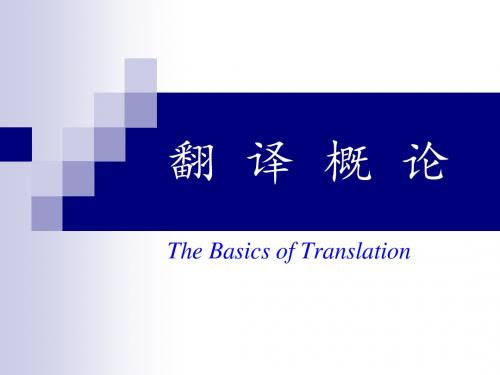
玄奘:在一定程度上继承了慧远的“厥中” 论,指出翻译“既须求真,又须喻俗”。 梁启超评价道:“若玄奘者,则意译直译, 圆满调和,斯道之极轨也。”不过在实际 的翻译实践中,玄奘有时却推崇“五不翻” 的音译技巧。正是这种技巧指导下的译文 让鲁迅感叹“粗粗一看,简直是不能懂 的”。(鲁迅《二心集》)
明末清初时期魏象乾在《繙清说》中表达 了自己对翻译的看法。刘半农指出此文涉 及的问题和观点“多与今世译人不谋而 合”。魏氏论及的一个重要问题是“翻译 之道”即“翻译标准”: “窃惟翻译之道,至显而寓至微,至约而 寓至博,信乎千变万化、神妙莫测也。惟 其变化无穷,遂有出入失正之弊,学者不 可不审焉。夫所谓“正”者,了其意,完 其辞,顺其气,传其神,不增不减,不颠 不倒,不恃取意,而清文精练,适当其可 也。”
失之交臂
1988年辜正坤发表“翻译标准多元互补论” 一文,认为“用以指导翻译实践并判断译 作价值的具体标准不但有,而且不止一 个”。这些标准构成了翻译标准的一个多 元系统:绝对标准——最高标准——具体 标准。在这个系统里,所有标准都统一于 绝对标准,翻译的绝对标准就是“原作本 身”。由于绝对再现原作不可能,所以翻 译只能追求最高标准,即“最佳近似度”。 要判断译文是否最近似于原文就需要一些 具体的标准衡量。具体标准是由翻译的功 能、人类的审美情趣以及读者、译者的多 层次性决定的,因此翻译的具体标准不止 一个。
莱斯的学生费米尔突破了对等理论的限制,以文 本目的(skopos)为翻译过程的第一准则,发展了 功能派的主要理论:目的论(skopos theory)。目 的论是功能派翻译理论中最重要的理论。skopos 是希腊词,意思是“目的”。根据目的论,所有翻 译遵循的首要法则就是“目的法则”:翻译行为 所要达到的目的决定整个翻译行为的过程,即结 果决定方法。这个目的有三种解释:译者的目的 (如赚钱);译文的交际目的(如启迪读者);和 使用某种特殊翻译手段所要达到的目的(如为了 说明某种语言中语法结构的特殊之处而采用按其 结构直译的方法)。通常情况下,―目的”是指译文 的交际目的。
翻译概论英语
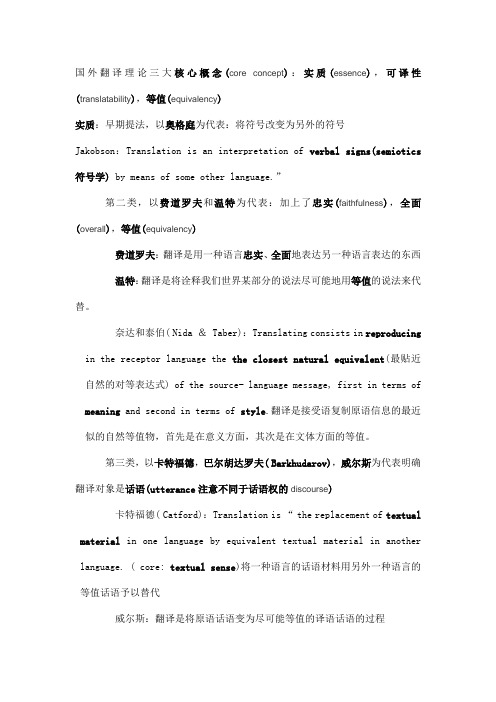
国外翻译理论三大核心概念(core concept):实质(essence),可译性(translatability),等值(equivalency)实质:早期提法,以奥格庭为代表:将符号改变为另外的符号Jakobson:Translation is an interpretation of verbal signs(semiotics 符号学) by means of some other language.”第二类,以费道罗夫和温特为代表:加上了忠实(faithfulness),全面(overall),等值(equivalency)费道罗夫:翻译是用一种语言忠实、全面地表达另一种语言表达的东西温特:翻译是将诠释我们世界某部分的说法尽可能地用等值的说法来代替。
奈达和泰伯( Nida & Taber):Translating consists in reproducing in the receptor language the the closest natural equivalent(最贴近自然的对等表达式) of the source- language message, first in terms of meaning and second in terms of style.翻译是接受语复制原语信息的最近似的自然等值物,首先是在意义方面,其次是在文体方面的等值。
第三类,以卡特福德,巴尔胡达罗夫( Barkhudarov),威尔斯为代表明确翻译对象是话语(utterance注意不同于话语权的discourse)卡特福德( Catford):Translation is “the replacement of textual material in one language by equivalent textual material in another language. ( core: textual sense)将一种语言的话语材料用另外一种语言的等值话语予以替代威尔斯:翻译是将原语话语变为尽可能等值的译语话语的过程巴尔胡达罗夫( Barkhudarov): A unit of translation is “ the smallest unit of SL which has an equivalent in TL.第四类,以什维采尔为代表,又增加了文化(culture)内容,王佐良先生(venerable Wang Zuoliang)认为:翻译工作者处理的是个别的词,面对的则是两大片文化。
英汉翻译(一)--翻译概论

翻译的形式
It is sometimes said that there is no task more complex than translation—a claim that can be readily believed when all the variables involved are taken into account. Translators not only need to know their source language well; they must also have a thorough understanding of the field of knowledge covered by the source text, and of any social, cultural, or emotional connotations that need to be specified in the target language if the intended effect is to be conveyed. The same special awareness needs to be present for the target language, so that points of special phrasing , local (e.g. regional) expectations, and so on, can all be taken into account.
Etymologically, “translate” is derived from the Latin word translatus, “ carried over.” Translatus is the past participle of transferre. If divided into trans and ferre, we can see the proximity of the word to dia and peherein. The Latin term ferre means “to carry” or “ to transport” as in carrying a shield, and was often used to mean to bear or convey with the notion of motion (Homer), as in ships borne by the forces of wind. If also meant to endure, to suffer, as in to bear a mental burden… (Gentzler, 2001:166)
《翻译概论》课程教学大纲
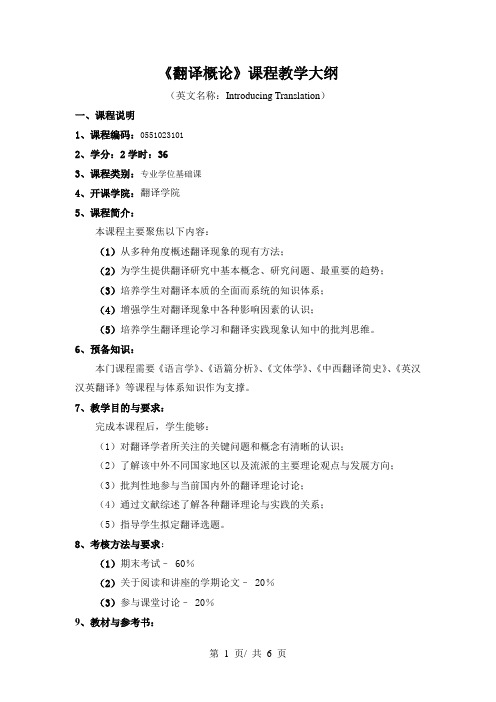
《翻译概论》课程教学大纲(英文名称:Introducing Translation)一、课程说明1、课程编码:05510231012、学分:2学时:363、课程类别:专业学位基础课4、开课学院:翻译学院5、课程简介:本课程主要聚焦以下内容:(1)从多种角度概述翻译现象的现有方法;(2)为学生提供翻译研究中基本概念、研究问题、最重要的趋势;(3)培养学生对翻译本质的全面而系统的知识体系;(4)增强学生对翻译现象中各种影响因素的认识;(5)培养学生翻译理论学习和翻译实践现象认知中的批判思维。
6、预备知识:本门课程需要《语言学》、《语篇分析》、《文体学》、《中西翻译简史》、《英汉汉英翻译》等课程与体系知识作为支撑。
7、教学目的与要求:完成本课程后,学生能够:(1)对翻译学者所关注的关键问题和概念有清晰的认识;(2)了解该中外不同国家地区以及流派的主要理论观点与发展方向;(3)批判性地参与当前国内外的翻译理论讨论;(4)通过文献综述了解各种翻译理论与实践的关系;(5)指导学生拟定翻译选题。
8、考核方法与要求:(1)期末考试– 60%(2)关于阅读和讲座的学期论文– 20%(3)参与课堂讨论– 20%9、教材与参考书:教材:Munday, J. 2008. Introducing Translation Studies: Theories and Applications (2nd Edition). London and New York: Routledge.参考书目:Baker, Mona. 1996. “Linguistics and Cultural Studies: Complementary or Competing Paradigms in Translation Studies?”. In Übersetzungswissenschaft im Umbruch: Festschrift für Wolfram Wilss, Angelika Lauer, Heidrun Gerzymisch-Arbogast, Johann Haller & Erich Steiner (eds.), 9-19. Tübingen: Gunter Narr Verlag. Benjamin, Walter. 1923/2000. “The Task of the Translator”. In The Translation Studies Reader, Lawrence Venuti (ed.), 2000, 15-25. London and New York: Routledge.Berman, Antoine. 1985/2000. “Translation and the Trials of the Foreign”. In The Translation Studies Reader, Lawrence Venuti (ed.). 284-97. London and New York: Routledge.Cheung, Martha. 2002. “Power and Ideology in Translation Research in Twentieth-Centur y China: An Analysis of Three Seminal Works”. In Crosscultural Transgressions, Theo Hermans (ed.), 144-164. Manchester, UK: St. Jerome Publishing.Even-Zohar, Itamar. 1990. "Polysystem Theory". Poetics Today 11(1): 9-26. Fawcett, Peter. 1995. “Translation and Power Play”. The Translator 1(2): 177-192. Gentzler, Edwin. 2001. Contemporary Translation Theories (2nd Rev. Edition).London/New York: Routledge. (chpt.5)Gutt, Ernst-August. 1991. Translation and Relevance: cognition and context. Oxford and Cambridge: Basil Blackwell. (pp.23-44; pp.170-195; pp.202-206)Gutt, Ernst-August. 1996. “Implicit Information in Literary Translation: A Relevance-Theoretic Perspective”. Target 8(2): 239-256.Holmes, James S. 1988. Translated!: Papers on Literary Translation and Translation Studies. Amsterdam: Rodopi. (chpt.6)Jääskeläinen, Riitta. 2000. “Focus on Methodology in Think-aloud Studies on Translating”. In Tapping and Mapping the Processes of Translation andInterpreting: Outlooks on Empirical Research, Sonja Tirkkonen-Condit and Riitta Jääskeläinen (eds.), 71-82. Amsterdam/Philadelphia: John Benjamins. Jakobson, Roman. 1959/2000. “On Linguistic Aspects of Translation”. In The Translation Studies Reader, Lawrence Venuti (ed.), 2000, 113-118. London and New York: Routledge.Neubert, Albrecht and Gregory M. Shreve. 1992. Translation as Text. Kent: The Kent State University Press. (pp.22-25; chpt.3)Nida, Eugene A. 1964. Toward a Science of Translating: with special reference to principles and procedures involved in Bible translating. Leiden: E. J. Brill.(pp.159-171)Nord, Christiane. 1997. Translating as a Purposeful Activity: F unctionalistA pproaches E xplained. Manchester, UK: St. Jerome Publishing. (chpt.7) Quine, Willard V. 1959. "Meaning and Translation". In On Translation, Reuben A.Brower (ed.), 1959, 148-172. Cambridge: Harvard University Press.Reiss, Katharina. 1977/1989. “Text Types, Translation Types and Translation Assessment”. In Readings in Transltion Theory, Andrew Chesterman (ed.), 105-115. Finland: Oy Finn Lectura Ab.Sperber, Dan & Deirdre Wilson. 1986. Relevance: Communication and Cognition.Oxford & Cambridge: Blackwell. (pp.46-53; pp.118-171)Steiner, George. 1998. After Babel: Aspects of Language and Translation (3rd Edition).Oxford/New York: Oxford University Press. (pp.312-319: “The Hermeneutic Motion”)Tirkkonen-Condit, Sonja. 2002. “Process Research: State of the Art and Where to Go Next?”Across Languages and Cultures 3(1): 5-19.Toury, Gideon. 1995. Descriptive Translation Studies and Beyond.Amsterdam/Philadelphia: John Benjamins. (Part One, chpt.2,Part Four) Venuti, Lawrence. 1995. The Translator’s Invisibility: A History of Translation.London and New York: Routledge. (chpt.1)Vermeer, Hans J. 1989/2000. “Skopos and Commission in Translational Action”. In The Translation Studies Reader, Lawrence Venuti (ed.), 2000, 221-232. Londonand New York: Routledge.Zhu, Chunshen. 2005. “Accountability in Translation Within and Beyond the Sentence as the Key Functional UT: Three Case Studies”. Meta 50(1): 312-335.二、教学内容纲要(共计36学时)Introduction (2学时)Chapter 1 Main issues of translation studies (4学时)1.1 The concept of translation1.2 What is translation studies?1.3 An early history of the discipline1.4 The Holmes/Toury “map”1.5 Developments since HolmesChapter 2 Translation theory before the twentieth century (2学时)2.0 Introduction2.1 “Word-for-word” or “sense-for-sense”2.2 Fidelity, spirit and truth2.3 Schleiermacher and the valorization of the foreignChapter 3 Equivalence and equivalent effect (4学时)3.0 Introduction3.1 Nida and “the science of translating”3.2 Newmark: semantic and communicative translation3.3 Later developments in equivalenceChapter 4 Studying translation product and process (4学时)4.0 Introduction4.1 Vinay and Darbelnet’s model4.2 Catford and translation “shifts”4.3 Option, markedness and stylistic shifts in translation4.4 The cognitive process of translation4.5 Ways of investigating cognitive processingChapter 5 Functional theories of translation (4学时)5.0 Introduction5.1 Text type5.2 Translatorial action5.3 Skopos theory5.4 Translation-oriented text analysisChapter 6 Discourse and Register analysis approaches (2学时)6.0 Introduction6.1 The Hallidayan model of language and discourse6.2 House’s model of translation quality assessment6.3 Baker’s text and pragmatic level analysis: a coursebook for translators Chapter 7 Systems theories (2学时)7.0 Introduction7.1 Polysystem theory7.2 Toury and descriptive translation studies7.3 Chesterman’s translation normsChapter 8 Cultural and ideological turns (2学时)8.0 Introduction8.1 Translation as rewriting8.2 Translation and gender8.3 Postcolonial translation theory8.4 The ideologies of the theorists8.5 Translation, ideology and power in other contextsChapter 9 The role of the translator: visibility, ethics and sociology (4学时) 9.0 Introduction9.1 The cultural and political agenda of translation9.2 The position and positionality of the translator9.3 The sociology and historiography of translation9.4 The power network of the translation industry9.5 The reception and reviewing of translationsChapter 10 Philosophical approaches to translation (2学时) 10.0 Introduction10.1 Steiner’s hermeneutic motion10.2 Ezra Pound and the energy of language10.3 The task of the translator: Walter Benjamin10.4 DeconstructionChapter 11 New directions from the new media (2学时) 11.0 Introduction11.1 Audiovisual translation11.2 Localization, globalization and collaborative translation 11.3 Corpus-based translation studiesChapter 12 Research projects (2学时)12.0 Introduction12.1 Research projects in translation studies。
翻译概论翻译直译和意译

CHENLI
17
(1). I want a man who will throw his hat over the Chindwin and then lead his troops after it.
我要的是这样一个人,他决心在钦敦江破 釜沉舟,然后率领部队前进。
CHENLI
18
(2)She didn`t like him much, but if she went out with him, it`d be one in the eye for Kath.
• 断肠” “breaking one’s intestines” “heart-breaking”
“玉颜” “jade face”
CHENLI
16
直译和意译兼用
• 在翻译实践中,直译和意译是不可分割的。 直译和意译兼用也被看作是 “平行式转换” (Paralleling)(刘宓庆《当代翻译理论》。 这中翻译方法是指在翻译过程中将直译和 意译二者结合,交替使用。
CHENLI
23
例证分析(3)
• 胆小如鼠 as timid as a hare • 一箭之遥 at a stone‘s throw • 落汤鸡 wet like a drown rat • 蠢得像猪 as stupid as a goose • 犟得像牛 as stubborn as a mule • 缘木求鱼 seek a hare in a hen‘s nest • 守口如瓶 as dumb as an oyster
CHENLI
8
英语句子结构与中文较为接近时
• 1) “Merry”, as you may know, has two meanings: happy and drunk.
英汉翻译概论[整理版]
![英汉翻译概论[整理版]](https://img.taocdn.com/s3/m/43de8e7cae1ffc4ffe4733687e21af45b307feaf.png)
Introduction概论English-Chinese,,,,,Translation,,,,,of,,,,,Practical,,,,,Stylistic,,,,,V arieties英汉应用文互译SYLLABUS⏹Introduction,,,,,⏹ 1.,,,,,English,,,,,brand,,,,,and,,,,,advertising,,,,,press⏹ 2.,,,,,English,,,,,for,,,,,contract,,,,,and,,,,,letter,,,,,⏹,,,,,3.English,,,,,for,,,,,sociability,,,,,writing⏹(sociable,,,,,letter/,,,,,testimonial/certification),,,,,⏹,,,,,4.English,,,,,for,,,,,daily,,,,,life⏹(instruction/names/introduction/poster/logo),,,,,Schools,,,,,of,,,,,translation⏹翻译的文艺学理论:艺术;译者的主动性和创造性⏹翻译的语言学理论:科学,SL和TL具有客观性,翻译过程种的语言现象的研究与分析⏹翻译的美学理论:审美过程;内容美,形式美,意境美⏹翻译的文体学理论:1960s,Halliday⏹“从文体学的观点来看,原文和译文在语言和题材的风格方面必须保持一致。
”,,,,,,,,,, ,,,,,,,,,,,,,,,,,,,,,,,,,,,,,,,,,,,,,,,,,,,,,,,,,,,,,,,,,,,,,,,,,,,,,,,,,,,,,,,,,,,,,,,,,,,,,,,,,,,,,,,,,,,,,,,,,,,,,,,,,,,,,,,,,,,,,,,,,, ,,,,,,,,,,,,,,,,,,,,,,,,,,,,,,,,,,,,,,,,,,,,,,,,,,,,,,,,,,,,,,,,,,,——布鲁姆菲尔德What,,,,,is,,,,,stylistic,,,,,varieties⏹Stylistics(文体学),,,,,,simply,,,,,defined,,,,,,is,,,,,a,,,,,discipline,,,,,that,,,,,studies,,,,,the,,,,,ways, ,,,,in,,,,,which,,,,,language,,,,,is,,,,,used;,,,,,it,,,,,is,,,,,a,,,,,discipline,,,,,that,,,,,studies,,,,,the,,,,,style,,,,,of,,,,,language,,,,,is,,,,,used.,,,,,⏹Language,,,,,,,,,,,,,,,The,,,,,way,,,,,,,,,,,,,,,The,,,,,style⏹Considering,,,,,different,,,,,communicative,,,,,environment,,,,,,methods,,,,,,objectives,,,,,and,,,,,purposes,,,,,,communicators,,,,,would,,,,,opt,,,,,different,,,,,lang uage,,,,,varieties,,,,,(语言变体),,,,,that,,,,,has,,,,,different,,,,,functions,,,,,so,,,,,as,,,,,to,,,,,perform,,,,,their,,,,, communication,,,,,effectively.,,,,,The,,,,,language,,,,,varieties,,,,,are,,,,,what,,,,,people,,,,,called,,,,,“style”,,,,,(文体或语体).Translation,,,,,techniques⏹直译与意译:,,,,,形式;意义⏹词类转换法:词性转化⏹增删法:词、词组、句子⏹句式转换法:句式特点;形合、意合⏹正反表达法:思维习惯⏹长句拆译法:语法结构和原文意义⏹变通手段:解释翻译、借译法、音译法、形译法应用文体的特点及其作用⏹ 1.应用文体的定义及其范畴⏹ 2.,,,,,应用文体的特点(文体)⏹ 3.,,,,,应用文体的功能与作用⏹ 4.,,,,,感受应用文体应用文体的定义⏹人们在日常工作和社会生活中为处理公私事务时所常用的具有直接使用价值和某种固定程式的各种文章的总称。
翻译概论课件..
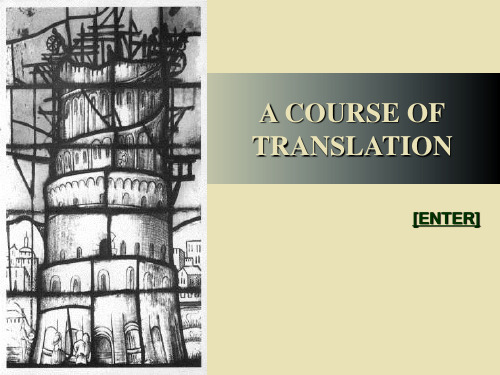
run into debt 负债 run one’s head into a wall 撞南墙,碰壁 The idea runs in his mind. 这个念头萦绕在 他的脑海里。 The street runs north. 大街向北延伸。 The news runs rapidly in the town. 这个消 息迅速在镇上传开。
鲁迅:“真好像做苦工,日子不好过”、 “字典不离手,冷汗不离身”。 傅雷:我译文的风格,令自己深以为苦,虽 已尽全力,却永远达不到满意的完美程 度……我尽量尝试译得忠于原文,而又不失 艺术性,务使译文看来似中文创作,惜仍然 力不从心。翻译之难,比起演奏家之演绎往 昔大师的杰作,实在不遑多让。
英汉词法翻译
1.根据语境确定词义 英语中一词多义、汉语中一字多义,这 是常见的语言现象。这就需要我们依靠 具体的上下文来判断某一个字或词语的 意义。
right
And not only has won, but because it has won, has been in the right. Adj.正义的 Might is right. n.公理 She tried her best to right her husband from the charge of robbery. Vt.申冤 You are quite right to refuse. Adj. 正确的 All came right in the end. Adv. 顺利
- 1、下载文档前请自行甄别文档内容的完整性,平台不提供额外的编辑、内容补充、找答案等附加服务。
- 2、"仅部分预览"的文档,不可在线预览部分如存在完整性等问题,可反馈申请退款(可完整预览的文档不适用该条件!)。
- 3、如文档侵犯您的权益,请联系客服反馈,我们会尽快为您处理(人工客服工作时间:9:00-18:30)。
spontaneous sociolinguistic observations (”Russians like diminutive suffixes better than Hungarians.”)
spontaneous text-linguistic observations (”The sentences of Indo-European languages start with a longer introductory part than the corresponding Hungarian sentences and have to be shortened in the Hungarian translation” or ”English, German, and Russian texts are more impersonal than Hungarian texts.”)
Translation Studies
1. Introduction to the theory of translation
Krisztina Károly, Spring, 2006 Sources: Klaudy, 2003; Baker, 1998
The nature of the translator’s
The medium of the translator’s activity = two languages
communicating in two Ls at the same time can never be as instinctive and unconscious as communicating only in one in translation, even the most instinctive translator develops ideas about the relationship between the two Ls, their similarities and differences, their relationship with reality, the similarities and differences in the way the two Ls segment reality linguistically, etc.
Earlier: translation was mostly done for pleasure by writers, poets, statesmen, priests, and scholars to satisfy their individual literary, political, and scientific ambitions. Second half of the 20th century: translating became a mass activity (source of earning a living) has become a profession in its own right
were not pooled for centuries!
The idea of an uninterrupted and organic development of TS must be rejected for 3 main reasons:
(1) Translation as a profession
“their ambition to explain translation phenomena and create theories is closely related to the very nature of this activity, regulated, on the one hand, by certain objective rules, and permitting, on the other, a number of subjective choices” (Klaudy, 2003, p.23)
The object of the translator’s activity = the text
Theories are related to the object of the translator’s activity, i.e. the text, because every text (e.g., a piece of literature, a scientific research article, an advertisement or an editorial), allows for several possible interpretations the translator often has to defend his own interpretation of the text against the potentially differing interpretations of critics, readers, and the public at large.
Is there continuity in the theory
of translation?
Practicing translators will often make
spontaneous contrastive linguistic observations (”Hungarian prefers verbs as opposed to Indo-European languages which prefer nouns.”)
activity = creative activity
The translator faces a number of choices and decisions.
decisions are partly subjective, partly objective (some of the translator’s subjective choices are based on objective factors)
